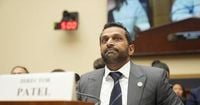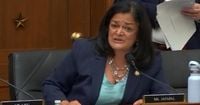WASHINGTON — The halls of Congress vibrated with tension and accusation this Wednesday as FBI Director Kash Patel took the hot seat for nearly five hours before the House Judiciary Committee, facing an onslaught of questions about the FBI’s handling of the Jeffrey Epstein scandal and his own leadership at the bureau. The hearing, convened on September 17, 2025, quickly became a battleground for competing narratives, with Democrats and some Republicans pressing Patel for answers on everything from alleged cover-ups to the FBI’s current crime-fighting record.
The focus of the day was the FBI’s handling of files related to Jeffrey Epstein, the late financier and convicted sex offender whose death in 2019 left a trail of unanswered questions and conspiracy theories. Representative Thomas Massie (R-Ky.), a libertarian who has allied himself with Epstein’s victims, delivered a bombshell allegation: that the FBI possessed a 2019 list of at least 20 powerful men accused of abusing Epstein’s victims, including minors such as Virginia Roberts Giuffre. Among those named, said Massie, were Barclays CEO Jes Staley, a Hollywood producer, a royal prince, a prominent figure in the music industry, a high-profile banker, a government official, a former politician, an Italian car company owner, a rock star, a magician, and six billionaires, one hailing from Canada.
Massie pressed Patel, “We know these people exist in the FBI files, files that you control... Have you launched any investigations into any of these people? And have you seen these... documents?”
Patel, for his part, met the accusations with skepticism, stating that prosecutors across multiple administrations had already investigated the same materials. “The bureau is not in the habit of releasing incredible information,” he said, emphasizing that the FBI had released all files courts currently allow. He also pointed out that there is no federal statute of limitations for underage sex trafficking—a fact that left the door open to future investigations, at least in theory.
Yet, the hearing was anything but a calm exchange of facts. Democratic Representative Pramila Jayapal (D-Wash.) accused committee members themselves of possibly partaking in Epstein’s sex trafficking and demanded that Patel meet directly with victims. “Would you meet with the women who were sexually abused and raped and groomed at the ages of 14 and 16 years old?” Jayapal insisted, her voice rising above the din. She pressed further: “Are you going to continue to cover up for the rich and powerful men, including those that might be on this committee?”
Patel bristled at the suggestion, stating unequivocally, “Any allegations that I’m a part of the cover-up to protect child sexual trafficking and victims of human trafficking and sexual crimes is patently and categorically false.” He maintained that the FBI had released everything it was legally permitted to share, and he challenged critics to point to evidence that could be credibly acted upon.
The hearing was also marked by partisan crossfire. Rep. Jamie Raskin (D-Md.), the top Democrat on the committee, accused Patel of turning the FBI into a political tool for President Trump and orchestrating a cover-up of Epstein files. Raskin’s opening statement was blistering, mocking Patel’s background and accusing him of using “henchmen” to politicize the bureau. Raskin charged, “You’ve betrayed Jeffrey Epstein’s victims and survivors, you’ve turned your back on the career law enforcement at the FBI, and as a result, you’ve left all of us less, less safe than before.”
Patel, who was narrowly confirmed as FBI director in February after a contentious Senate battle, has been a lightning rod for criticism. Democrats lambasted his lack of prior FBI experience and questioned his loyalty to Trump. Rep. Jasmine Crockett (D-Texas) was unsparing: “When I say that you are the least qualified FBI director in the history of the FBI, that is real.” She added, “We just need to tell you, ‘bye-bye.’”
Yet, Patel found defenders among Republicans. Committee Chairman Jim Jordan (R-Ohio) praised Patel’s efforts to refocus the FBI on crime-fighting rather than politics, crediting him with moving agents out of Washington and putting “bad guys behind bars.” Rep. Andy Biggs (R-Ariz.) called Patel a “breath of fresh air,” and Rep. Darrell Issa (R-Calif.) lauded his transparency.
Beyond the Epstein case, the hearing touched on the recent assassination of conservative activist Charlie Kirk on September 10, 2025. While Democrats pressed Patel on the FBI’s response and criticized his handling of the investigation, Patel largely declined to discuss specifics, citing the ongoing nature of the probe. He did confirm that the FBI was investigating chatroom activity linked to the suspect, Tyler Robinson, and that several individuals were being questioned.
Patel also faced questions about a purportedly fake letter, allegedly signed by President Trump for Epstein’s 50th birthday in 2003. When asked by Rep. Jared Moskowitz (D-Fla.) whether he would investigate the matter, Patel replied, “Sure, I’ll do it.” The authenticity of the letter remains in dispute, with Trump and the White House denying its legitimacy.
Financial questions loomed large as well. The committee debated a motion by Rep. Raskin to subpoena the CEOs of JPMorgan, Bank of America, Bank of New York, and Deutsche Bank for reports about $1.5 billion in suspicious transactions related to Epstein. The motion failed by a single vote, with Massie siding with Democrats. Jamie Dimon, CEO of JPMorgan Chase, told reporters he would comply with any order to produce records, saying, “We regret any association with that man at all.”
Patel used the hearing to highlight what he described as historic successes under his leadership: a nationwide decline in crime, a dramatic reduction in fentanyl entering the U.S., and the lowest murder rate in modern history. He attributed these results to the “empowerment and resources” provided by President Trump’s administration, and he dismissed his critics with characteristic bluntness: “I don’t give a damn what they say about me as long as I’m succeeding in the mission.”
Still, concerns about transparency and accountability persisted. Lawmakers from both parties pressed Patel on why the FBI had not released summaries of interviews with Epstein’s victims, some of whom have publicly named other alleged abusers. Patel insisted the FBI had repeatedly asked for more evidence and would act on any credible information provided. He also noted that mishandling of the original federal probe into Epstein—particularly the 2008 plea deal—had hampered efforts to get a full picture of his crimes.
As the hearing wound down, the political divide was as sharp as ever. Republicans accused Democrats of only caring about the Epstein files now that Trump is president, while Democrats argued that Patel’s leadership had made the FBI a political enforcement agency. Meanwhile, the victims of Epstein’s crimes—and the American public—were left waiting for answers that remain frustratingly out of reach.
With tempers flaring and accusations flying, the House Judiciary Committee’s marathon hearing underscored just how fraught the quest for truth and justice remains in the Epstein saga—and how far Congress and the FBI still have to go to regain the public’s trust.





